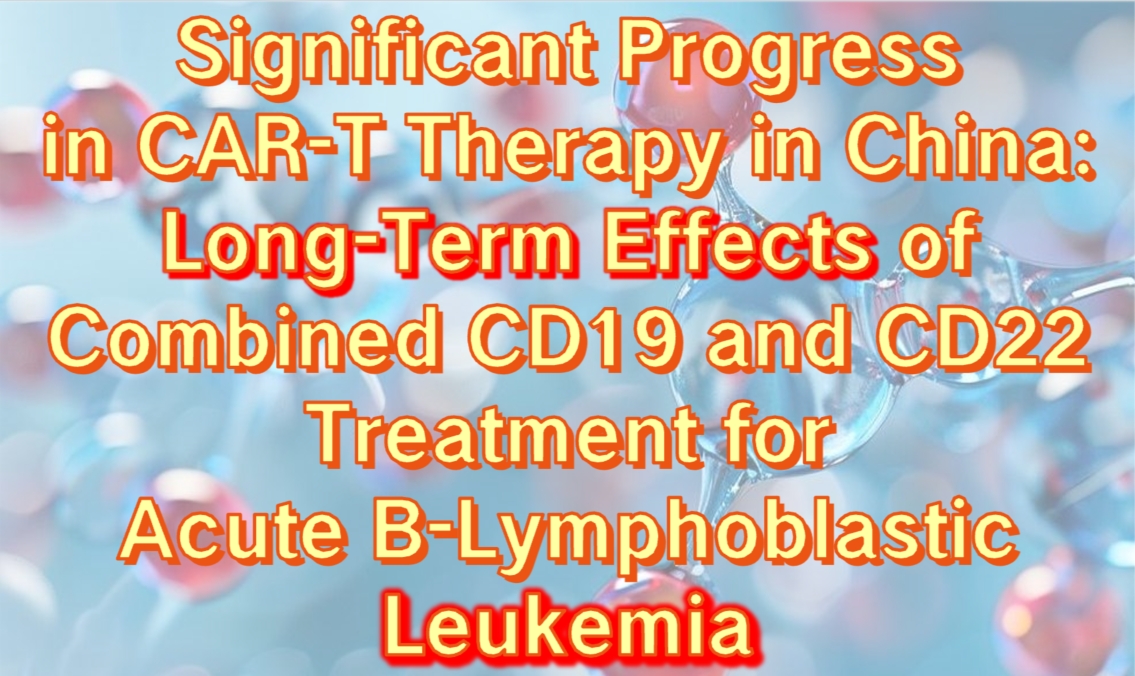Warning: Trying to access array offset on value of type bool in /www/wwwroot/www.medtourcn.com/wp-content/themes/medical-directory/framework/theme/medicaldirectory-image.php on line 78
Warning: Trying to access array offset on value of type bool in /www/wwwroot/www.medtourcn.com/wp-content/themes/medical-directory/framework/theme/medicaldirectory-image.php on line 79

Significant Progress in CAR-T Therapy in China: Long-Term Effects of Combined CD19 and CD22 Treatment for Acute B-Lymphoblastic Leukemia
### Significant Progress in CAR-T Therapy in China: Long-Term Effects of Combined CD19 and CD22 Treatment for Acute B-Lymphoblastic Leukemia

Leukemia
#ALL #CAR-Ttherapy #Leukemia #CancerResearch #B_ALL #LeukemiaTreatment
Recently, a Chinese medical team published a notable study titled “Five-year outcome of CD19 combined with CD22 CAR-T cell therapy in B-ALL patients relapsed after allo-transplantation.” The research highlights the long-term efficacy of combined CD19 and CD22 CAR-T cell therapy in patients with relapsed acute B-lymphoblastic leukemia (B-ALL) after allogeneic hematopoietic stem cell transplantation (allo-HCT). This breakthrough has not only brought new hope to B-ALL patients but also attracted significant global attention.
**Background and Significance**
Acute B-lymphoblastic leukemia is a hematologic malignancy with poor prognosis, especially for patients who experience relapse after allo-HCT, where survival rates are significantly reduced. CAR-T cell therapy in China has shown increasingly positive results in treating B-ALL, particularly in targeting the CD19 antigen. However, the effects of targeting the CD22 antigen and its potential in combination with CD19 therapy are still under deeper investigation.
**Study Design and Methodology**
Based on a previous phase I clinical trial, this study involved a follow-up of 27 patients who had received CD19 CAR-T treatment. To comprehensively assess the treatment’s efficacy, the study also included three additional patients who experienced relapse with minimal residual disease (MRD) in the bone marrow. Although these patients did not meet the initial trial’s criteria, they received combined CD19 and CD22 CAR-T cell therapy under the same protocol. The CAR-T cells used in this study were second-generation designs created via lentiviral vector transfection.
**Study Results**
After a 5-year follow-up, the Chinese research team found that combined CD19 and CD22 therapy significantly improved patients’ long-term survival rates. Among the 30 patients who completed the combined therapy, the median follow-up time was 64.4 months. After two complete treatment cycles, patients maintained sustained remission. Survival analysis showed that the 3-year and 5-year overall survival rates reached 79% and 75%, respectively, with event-free survival rates of 54% and 50%. These results indicate that combined CD19 and CD22 CAR-T cell therapy offers substantial long-term efficacy for relapsed B-ALL patients.
**Conclusions and Future Outlook**
This study not only validates the potential of CAR-T cell therapy in hematologic malignancies but also provides new therapeutic insights for clinical practice. The combination of CD19 and CD22 holds promise for offering a more effective treatment option for B-ALL patients who relapse after allo-HCT, significantly improving their long-term survival rates.
As research in CAR-T cell therapy deepens, we may see more targeted approaches and optimized treatment protocols emerge. China’s active exploration and innovation in this field bring renewed hope to hematologic cancer patients worldwide, with the expectation that CAR-T therapy will further improve survival rates and quality of life for B-ALL patients in the near future.
To assess whether the condition is suitable for CAR-T therapy, you can submit pathology reports, treatment history, and discharge summaries to the Medical Department of Advanced Medicine in China for preliminary evaluation!
WhatsApp: Https://wa.me/+8613717959070
Email: doctor.huang@globecancer.com
#Immunotherapy #CD19CD22Combo #StemCellTransplant #ChinaMedicalResearch #Hematology #CancerBreakthrough #LongTermSurvival #BloodCancer
The new hope for pediatric patients with relapsed/refractory B-cell acute lymphoblastic leukemia (R/R B-ALL) boasts an overall survival rate of up to 96%.
The new hope for pediatric patients with relapsed/refractory B-cell acute lymphoblastic leukemia (R/R B-ALL) boasts an overall survival rate of up to 96%.

Recently, CAR-T cell therapy targeting B-cell malignancies has encountered a series of inquiries and challenges, particularly concerning discussions on CAR-T cell-related toxicity, resistance, antigen escape, and limitations in persistence. However, a groundbreaking concept addressing relapse in patients after CAR-T cell therapy has been introduced for the first time: a sequential approach involving distinct targeted CAR-T cell therapies.
Within this approach, CD19 CAR-T cell therapy has demonstrated the ability to achieve complete remission in 60% to 90% of relapsed or refractory acute B-cell lymphoblastic leukemia patients. By experimenting with different combinations and sequential administration strategies of B-cell antigen-targeted CAR-T cell therapies, there’s potential to prevent tumor antigen escape and prolong the persistence of CAR-T cells.
Preliminary clinical trials have provided initial support for this concept, notably a phase II clinical trial aimed at assessing the efficacy of sequential CD19 and CD22 CAR-T cell therapy. Its findings revealed a 79% event-free survival rate, an 80% sustained remission rate, and an impressive 96% overall survival rate among patients receiving targeted doses in sequential therapy. Encouragingly, the overall safety of this sequential therapy appeared manageable, providing long-term survival benefits for children with relapsed or refractory acute B-cell lymphoblastic leukemia.
However, the limitations of antigen escape and limited persistence after CAR-T cell therapy persist. Addressing these challenges, researchers have proposed the hypothesis of sequential administration of CAR-T cell products targeting different antigens, aiming to maintain the persistence of CAR-T cells.
The results of this phase II clinical trial indicate that administering CD22 CAR-T cell therapy following CD19 CAR-T cell infusion can result in longer-lasting remission effects for pediatric patients with relapsed or refractory B-cell acute lymphoblastic leukemia, achieving an 80% sustained remission rate over 18 months and an impressive 96% overall survival rate. Importantly, the overall safety of this sequential therapy is uplifting, providing long-term survival benefits for this specific patient population.
In summary, this study presents groundbreaking evidence for new strategies and directions in CAR-T cell therapy. Despite existing limitations, this therapy demonstrates significant potential in treating uncontrollable acute B-cell lymphoblastic leukemia, potentially offering more enduring treatment effects and long-term survival benefits for these patients. This achievement points towards a viable path for the future development of cell therapies.
This Phase 2 trial, conducted at Beijing GoBroad Boren Hospital in China, enrolled pediatric patients aged 1–18 years diagnosed with relapsed or refractory B-cell acute lymphocytic leukaemia (ALL) showing CD19 and CD22 positivity exceeding 95%.

